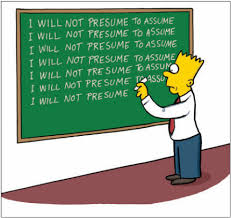Thoughts on Bayne’s article: ‘Technology Enhanced Learning’

 Bayne’s main key argument is to highlight assumptions made of the terminology of Technology Enhanced Learning (TEL). She negotiates three theoretical perspectives, calling into question the rhetoric of TEL.
Bayne’s main key argument is to highlight assumptions made of the terminology of Technology Enhanced Learning (TEL). She negotiates three theoretical perspectives, calling into question the rhetoric of TEL.
The level of detail applied to the terminology ‘Technology Enhanced Learning’ itself is impressive. Bayne goes a long way to prove that such a phrase is the ‘lingua franca’; to justify her stance of examining the definition TEL and thereby making it explicit. However, this seems to me a question of semantics. Any terminology is going to be problematic.
Bayne puts forward a convincing argument that technology is often considered in simplistic ‘common-sense’ terms; she draws from the Hamilton & Friesen paper, looking at essentialist and instrumentalist perspectives on how we perceive technology. I do not think that there is anything wrong in either perspective; each perspective has an element of truth. However, both Hamilton& Friesen and Bayne argue that it needs to become more mainstream to consider that technology is more inextricably linked with the social; something I agree with. This, I think, is happening much more now in 2021 than it was when Bayne and Hamilton wrote their papers in 2013 and 2015.
![]() To use teenagers as an example. Most of teenagers’ social interaction now is shaped by technology. Most of their information is also shaped by technology. Technology is everything to a teenager. Snapchat, TikTok, Houseparty, Instagram, Facebook: these are may not be considered ‘educational’, but they form the backbone of communication and interaction. They may enhance my life experience, as a middle aged adult, but for some teenagers and young adults they go beyond enhancing experience; they are a transformative experience. What technology has the power to do is now contingent on societal reality. There is a full enmeshment of technology and society, which arguably Bayne predicted 6 years ago. The role of social media and recent events in the USA is another example.
To use teenagers as an example. Most of teenagers’ social interaction now is shaped by technology. Most of their information is also shaped by technology. Technology is everything to a teenager. Snapchat, TikTok, Houseparty, Instagram, Facebook: these are may not be considered ‘educational’, but they form the backbone of communication and interaction. They may enhance my life experience, as a middle aged adult, but for some teenagers and young adults they go beyond enhancing experience; they are a transformative experience. What technology has the power to do is now contingent on societal reality. There is a full enmeshment of technology and society, which arguably Bayne predicted 6 years ago. The role of social media and recent events in the USA is another example.
Bayne argues against the using term ‘enhanced’, using transhumanist and posthumanist arguments. I found this pretty heavy going, but I can see the academic interest and need to debate how far technology may enhance learning and indeed the human being. I think it goes a step further and should be described as ‘transformative’. However, Bayne argues that we should be ‘critical protagonists in wider debates on the new forms of education…worked through by contemporary technological change.’ I think that is a definition of ‘transformative’.
I like the term ‘learning’. I like the autonomy to be given to the learner to learn. Teaching versus Learning? My stance is as an educator of children and teenagers. I believe in active learning. I have seen it in action. I believe in social engagement, in opening minds to critically think and question. Bayne talks about the ‘pre-defined needs of the learner’. She talks about ‘a major reason for engagement in education is to find out what it is that one actually needs’. Young learners don’t necessarily know what they need to learn. However, I also recognise that successful learning comes about through brilliant teaching. We need to be careful of teachers pre-determining what they think students need to learn. Technology needs to allow open-minded, creative teaching to take place that transforms the learning experience.
In the Forum on Moodle, Robert Chmielewski, one of my fellow students hopes there will be an alternative term to replace the critiqued ‘TEL’. But does it really matter? The technological, the digital needs to be transformative and enabling when considered alongside education. It needs to help teachers teach and help learners learn. Does it really matter what we call it?




Again, an interesting and thoughtful post. You’ll have see my recent comments on distinguishing between a research/ theoretical/ analytical perspective vs a practice one in relation, for example, in your comments on the relationship between the social and the technological.
A key aspect of Bayne’s paper – and many others that you’ll come across – is that words or discourses matter. Rather than more minor issues of semantics, how we talk about a thing starts to shape how that thing is understood and where its boundaries lie. So TEL is a way of understanding digital education that includes certain assumptions or ways of thinking about digital education that need to be surfaced, understood and critiqued. So the term ‘Enhanced’ implies learning as we know it is improved by technologies in a singular direction (from worse to better) and, so Bayne argues, obscures the possibilities of technologies affording very radical rethinks of learning (transformative effects as you say). Similarly, using the term ‘learning’ has the effect of avoiding discussions on the purpose of education (this is the nub of Biesta’s concept of ‘learnification’ which you may have seen in the Manifesto). Arguably, teachers teach to a pre-determined result as dictated by a, for example, national curriculum. But there are plenty of people that would disagree, that the use of ‘TEL’ has not had the effects Bayne argues or that all the discursive trends that lead to Biesta’s learnification have not, in fact, erased opportunities to question, debate and critique the purposes of education.
Your comment: “The technological, the digital needs to be transformative and enabling when considered alongside education. It needs to help teachers teach and help learners learn. Does it really matter what we call it?” is helpful. I think you would be interested in pragmatism as a theoretical lens for critiquing some of these – see, for example, this recent paper: https://www.frontiersin.org/articles/10.3389/feduc.2020.583157/full from the Frontiers in Education journal. Let me know what you think.
I really enjoyed reading the paper you suggested by Newton et al on pragmatism. It gave a very useful overview on educational research and theories, as well as advocating pragmatism as useful way forward in educational development.
This is an important paper as it highlights the dangers of pigeon-holing learners and their ‘styles’ of learning; teachers and their ‘best practice’ and suggests we should be much more pragmatic in our approaches to pedagogical development.
I like the importance given to the three premises of ‘Context’, ‘Research’, ‘Judgement’. That seems to me to make perfect sense. Educational development should be allowed to ask important questions such as what works, for whom, in what circumstances, and why? How much does it cost, what is it compared to, how practical is it to implement?. This should also be applied to the development and role of technology within education too?